Why Persuasion is a Superpower
Have you ever met someone who seems to get what they want effortlessly? They close deals, make friends easily, and command respect. What they have mastered is the power of persuasion—the ability to influence people without coercion or deceit.
Many people mistake persuasion for manipulation, but they are completely different. Persuasion is about building trust and helping others see your perspective in a way that benefits both parties. Manipulation, on the other hand, is selfish and deceitful. If you learn how to persuade ethically, you can unlock new opportunities in business, relationships, and personal growth while staying true to yourself.
The Psychology Behind Persuasion and Trust
The Science of Influence
Dr. Robert Cialdini, a social psychologist, outlined six key principles that govern the power of persuasion:
- Reciprocity – People feel obligated to return favors.
- Commitment and Consistency – Once someone commits to something, they tend to stick with it.
- Social Proof – We trust what others approve of or recommend.
- Authority – People are more likely to follow those who seem knowledgeable.
- Liking – We’re more easily persuaded by people we like and relate to.
- Scarcity – When something is rare, we value it more.
Understanding these principles can help you become a stronger communicator, whether you’re negotiating a business deal or simply trying to convince a friend to try a new restaurant.
Trust: The Foundation of Influence
People don’t listen to those they don’t trust. Building credibility requires honesty, consistency, and real engagement. Think about it—who would you rather take advice from? A person who constantly changes their opinions or someone who stands firm on their values?
The 5 Core Skills of Persuasion
1. Active Listening – The Secret Weapon
Most people think persuasion is about talking, but listening is just as crucial. When you truly listen, you make people feel heard and respected, which makes them more open to your ideas.
Pro Tip: Next time you’re in a conversation, try mirroring—repeat the last few words the other person says in a natural way. It shows you’re engaged and encourages them to elaborate.
2. Mastering Emotional Intelligence (EQ)
People are driven by emotions, not logic. If you can tap into their feelings and needs, you can connect on a deeper level. This means being aware of your own emotions and reading others’ cues effectively. Learning to empathize is the key; it is not the same as sympathizing. The ability to put yourself in their shoes is a skill that is worth investing in.
Example: I once had a skeptical client who didn’t think they could benefit from coaching and consulting. Instead of arguing, I asked about their biggest struggles and just listened. Eventually, they opened up, and after a few conversations, we ended up working together.
3. Asking the Right Questions
Questions guide conversations. Instead of telling someone they’re wrong, ask questions that make them reflect. Great leaders ask great questions. The quality of the response will depend on the quality of the question that is being asked.
Example: Instead of saying, “You should save more money,” ask, “If you could be financially free in 10 years, what would you do differently today?” This shifts the focus from resistance to self-reflection.
4. Nonverbal Communication: What Your Body Says Before You Speak
Your words are only part of persuasion—your tone, facial expressions, and body language matter just as much.
- Maintain eye contact to show confidence.
- Use open gestures to appear approachable.
- Mirror the other person’s body language subtly to build rapport.
5. Storytelling – The Most Powerful Persuasion Tool
Facts tell, but stories sell. People connect with emotions, not just information. If you can craft a compelling story, your message will stick. The power to persuade will stem from your ability to tell compelling stories. The reason is that stories are more relatable versus just information being told.
Example: Instead of listing statistics about job satisfaction, tell a relatable story about someone who took control of their career and found success. People will remember the story more than the numbers.
Ethical Persuasion vs. Manipulation – Know the Difference
Using the power of persuasion is about guiding others toward the best decision for them, while manipulation is about control. Ethical persuasion always respects the other person’s autonomy.
Before trying to persuade someone, ask yourself: Am I helping them make a better choice, or am I only looking out for myself? If it’s the latter, rethink your approach.
Applying Persuasion in Everyday Life
Persuasion in Leadership & Business
- Entrepreneurs and leaders use persuasion to rally teams and sell ideas.
- Great leaders inspire trust, which makes their persuasion effortless.
Example: Steve Jobs didn’t just sell Apple products; he sold a vision of innovation and simplicity. That’s persuasion at its best. The greatest leaders have a compelling vision so big that others can place their vision inside theirs.
Persuasion in Personal Relationships
- Persuasion helps resolve conflicts and build stronger relationships.
- It can also help you set boundaries and say no without causing friction.
Example: Instead of saying, “I can’t help you move this weekend,” say, “I wish I could help, but I already committed to something. Maybe I can help in another way?” This keeps the relationship intact while reinforcing your boundaries.
Persuasion to Break Free from Limiting Systems
Society often teaches us to follow rules without questioning them. But those who think for themselves and challenge norms often find the most success. Persuasion isn’t just about influencing others—it’s about persuading yourself to break free from limiting beliefs.
- Stop accepting outdated career advice.
- Question financial myths that keep you stuck in debt.
- Challenge the education system if it doesn’t align with your goals.
This is our mission here at Permission Free Living: to inspire others to think for themselves.
Final Thoughts: Become an Ethical Persuader and Win in Life
The power of persuasion is one of the most valuable skills you can develop. It helps you build trust, influence decisions, and ultimately, take control of your future. But always use it responsibly—persuasion is not about tricking people; it’s about guiding them toward the best possible outcome.
So, here’s your challenge: Pick one persuasion technique from this article and apply it in your next conversation. Watch how people respond differently. The more you practice, the more natural persuasion will become.
Master persuasion, and you’ll master life.
References
- Cialdini, Robert B. Influence: The Psychology of Persuasion. Harper Business, 2006.
- Goleman, Daniel. Emotional Intelligence: Why It Can Matter More Than IQ. Bantam, 1995.





